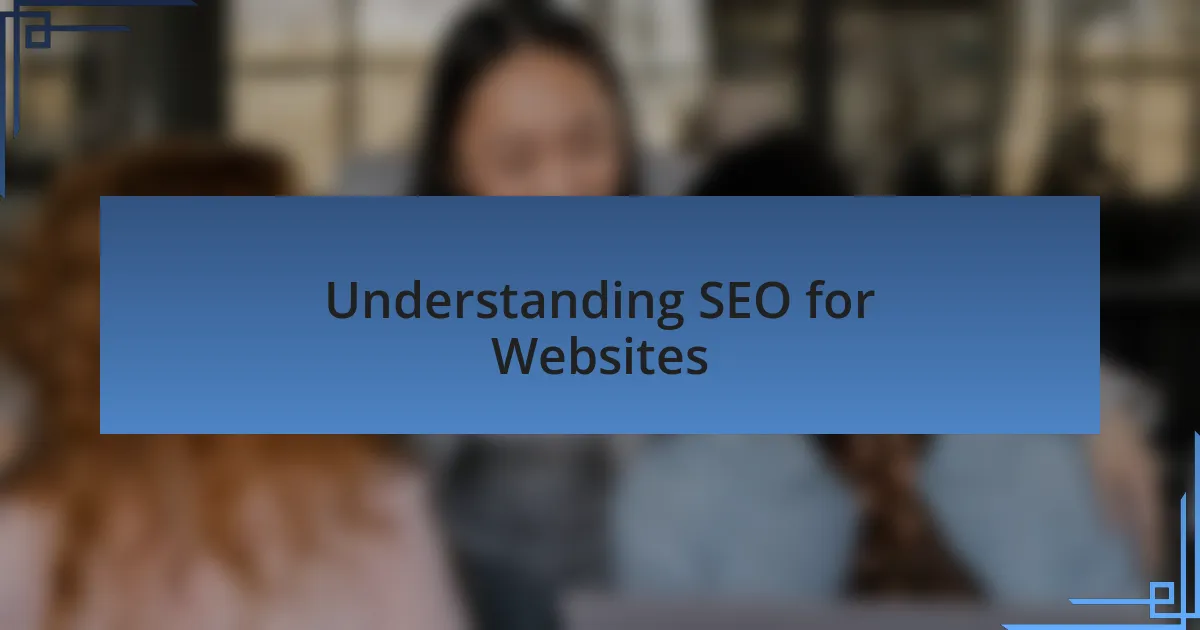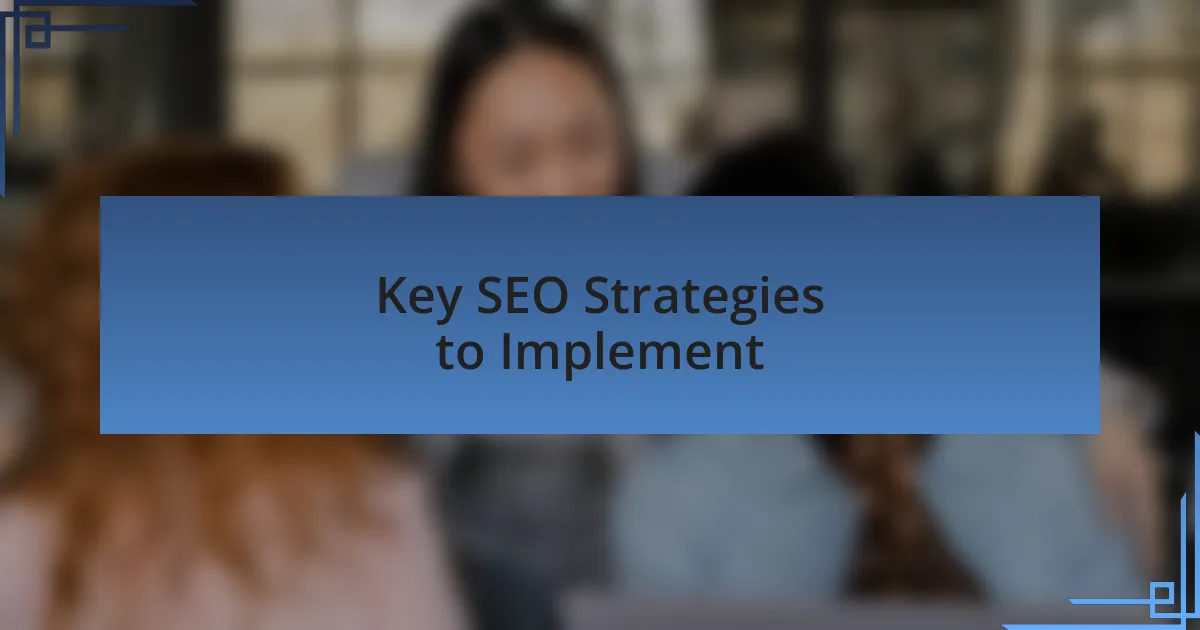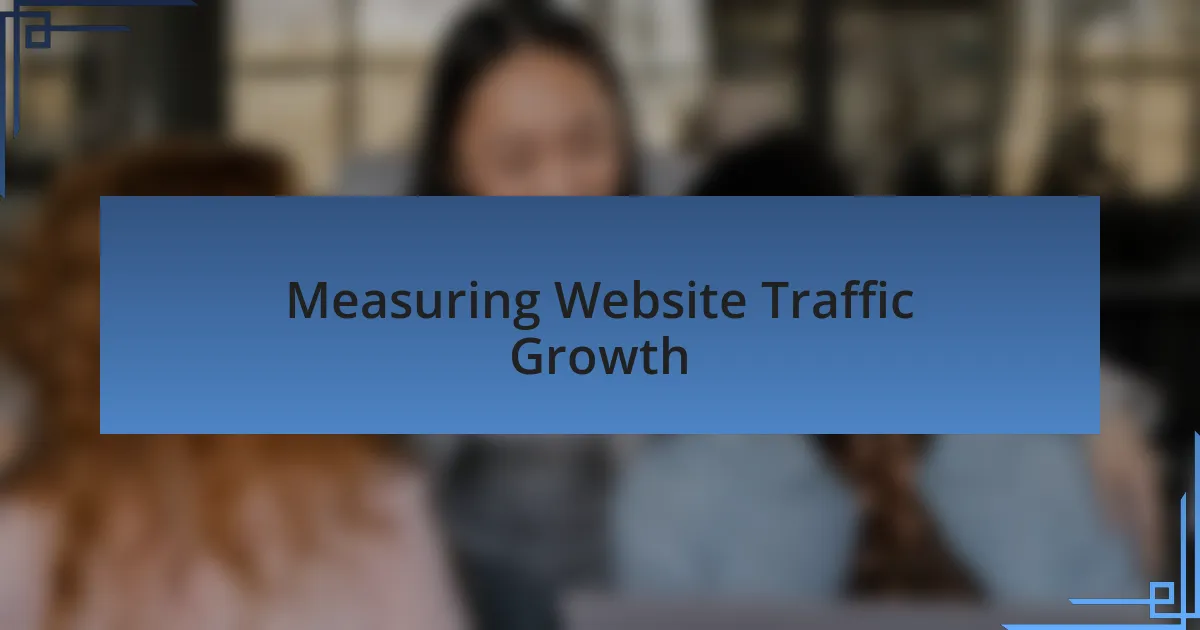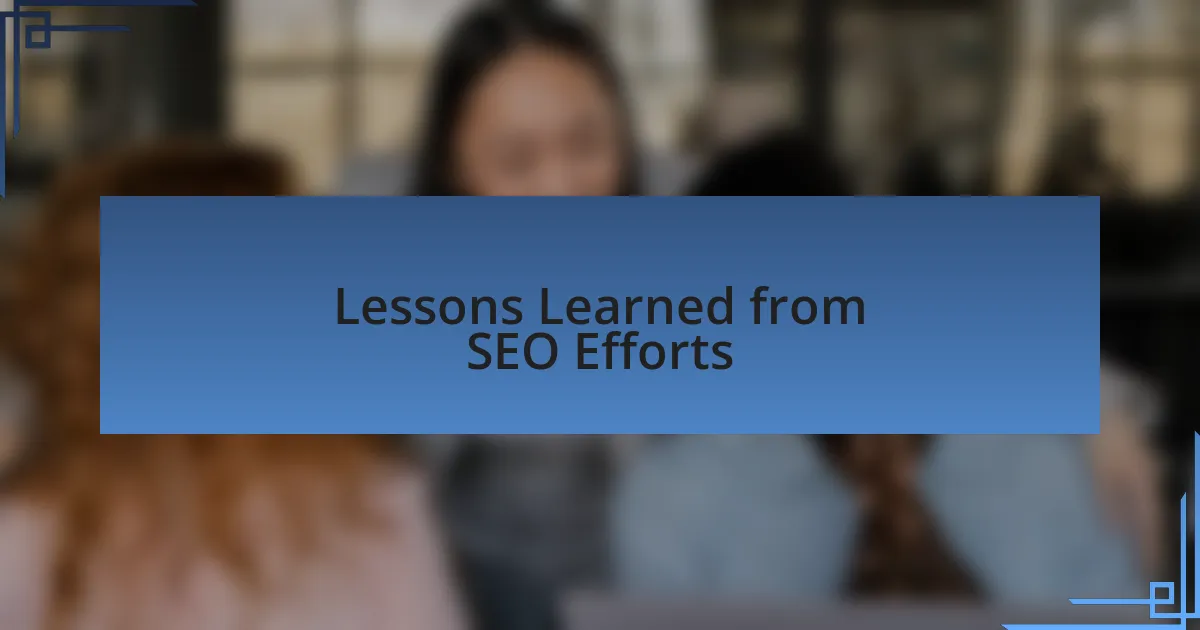Key takeaways:
- Keyword research is essential for understanding audience needs and improving content relevance.
- Building high-quality backlinks and focusing on user experience significantly boosts credibility and traffic.
- Utilizing analytics tools like Google Analytics and SEMrush helps refine SEO strategies based on data-driven insights.
- Consistency in content creation and collaboration within the digital marketing community enhances SEO effectiveness.

Understanding SEO for Websites
Understanding SEO for websites is the foundation for driving organic traffic. I remember my first experience with SEO; I felt overwhelmed by the technical jargon and endless strategies. Back then, I asked myself, “How can I make sense of all this?” Taking a step back and focusing on the basics helped me immensely.
One key aspect that often gets overlooked is keyword research. Initially, I underestimated its importance; I thought if I wrote great content, the audience would come. However, once I invested time in understanding what my target audience was searching for, it was like turning on a light in a dark room. Imagine how exciting it would be to write with clarity about what people are genuinely looking for!
Furthermore, optimizing on-page elements such as titles, meta descriptions, and headings can have a significant impact. When I started paying attention to these details, I noticed a marked improvement in my click-through rates. Isn’t it fascinating how these small adjustments can lead to greater visibility and engagement? It’s this kind of insight that transformed my approach and made SEO feel less like a daunting task and more like an exciting opportunity.

Key SEO Strategies to Implement
One powerful strategy that I found to be game-changing is building high-quality backlinks. Early on, I would hear this term thrown around, but I didn’t fully grasp its importance until I began reaching out to relevant websites and bloggers for collaborations. The thrill of earning a backlink from a reputable site not only boosted my credibility but also increased my traffic significantly. Have you ever wondered how a simple link can open new doors and connect you with a wider audience? It’s all about establishing trust and authority in your niche.
Another crucial element is focusing on user experience (UX). I used to prioritize content creation above all else, but then I realized that if users can’t navigate my site easily, my amazing content would go unnoticed. Simple changes, like improving site speed and mobile responsiveness, made a huge difference. I felt this rush of satisfaction when I saw my bounce rates drop after implementing these improvements. Don’t you think that a smooth browsing experience enhances user engagement?
Lastly, analytics should not be overlooked. In the beginning, I avoided diving deep into my website’s data, thinking it was too technical. However, once I embraced tools like Google Analytics, it became clear how vital they are for making informed decisions. Analyzing which pages attracted traffic and understanding user behavior helped me refine my strategies. It’s amazing how data can transform your instinctual decisions into targeted, effective actions, right?

Measuring Website Traffic Growth
Measuring website traffic growth is crucial for understanding the effectiveness of your SEO strategies. When I started paying attention to my site metrics, I noticed that not all traffic is created equal. I remember the excitement of seeing an increase in visitors, but then I realized it was just as important to look at where they came from. Are they coming from organic searches, social media, or referrals? Each source tells a different story about how my strategies were performing.
I often find myself diving into Google Analytics to track key metrics like average session duration and pages per session. At first, it felt overwhelming, but now I view it as a window into my audience’s journey. For example, after noticing a high bounce rate on a specific page, I decided to revamp the content and add more engaging visuals. What a difference it made! I felt a wave of relief seeing those numbers improve, reinforcing that thoughtful tweaks can lead to substantial growth.
Another method I’ve employed is utilizing tools like SEMrush to compare my traffic against competitors. It’s fascinating to analyze fluctuations in their traffic and uncover potential opportunities for my own site. Have you ever looked at what others are doing and felt that spark of inspiration? It’s like gathering puzzle pieces that can lead me to new tactics for driving growth. Each piece of data not only measures progress but also fuels my curiosity to keep exploring and innovating.
![]()
Tools for Tracking SEO Performance
Tracking SEO performance is much easier with the right tools. One of my go-to resources is Ahrefs. When I first explored its capabilities, I was surprised by its depth of data—from keyword rankings to backlink analysis. I remember the sense of empowerment I felt when I could pinpoint exactly which keywords were driving traffic. How satisfying is it to see a strategy come to life through solid numbers?
Another fantastic tool is Moz. Their metrics, like Domain Authority, helped me gauge my site’s strength relative to competitors. I vividly recall the moment I saw my score steadily rising; it motivated me to push even harder with my optimization efforts. Have you ever experienced that rush of excitement from small victories? It’s those little metrics that help foster a larger growth mindset.
Finally, I can’t overlook the value of Google Search Console. This tool offers insights straight from the search engine, and analyzing the click-through rates on different pages was an eye-opener for me. I’ll never forget the day I realized that a small tweak in meta descriptions could significantly impact my visibility. Have you considered how even minor changes can lead to such dramatic results? It really drove home the importance of monitoring and tweaking my SEO strategies continuously.

My Personal SEO Success Story
I vividly remember the first time I implemented a comprehensive SEO strategy on my blog. Watching my organic traffic steadily climb was exhilarating. Suddenly, the little blog I started as a hobby became a hub for engagement, and I couldn’t help but celebrate those first significant jumps in visitors. Have you ever felt that rush when you realize your efforts are paying off in real time?
As I dived deeper into keyword research, I discovered the importance of long-tail keywords. It was a game-changer for me. I recall crafting content specifically targeting these phrases and noticing a remarkable increase in relevant traffic. What surprised me most was how often users found my site through queries I hadn’t initially thought of. It’s fascinating to see the world of search open up in ways you never expect, right?
One pivotal moment was when I optimized my website’s loading speed. Initially, I didn’t see it as a major priority. However, after attending a seminar and hearing firsthand tales of how site speed influences rankings and user experience, I took action. The results were immediate; my bounce rate plummeted, and my audience started engaging more. Isn’t it incredible how something that seemed minor could have such a profound effect? Each of these experiences reinforced my belief that SEO is both an art and a science—where small, thoughtful adjustments can yield substantial rewards.

Lessons Learned from SEO Efforts
The first lesson I learned from my SEO journey was the undeniable power of analytics. I remember feeling overwhelmed when I first started analyzing my website traffic data. It was like stepping into a whole new world, and every chart and graph held valuable insights. The moment I realized how targeted adjustments based on real data could lead to significant changes in traffic made me wonder—how many others are missing out on these insights by not digging into their numbers?
Another key takeaway was the importance of consistency in content creation. There were times when my posts became sporadic, and I noticed a dip in engagement. That experience taught me that SEO isn’t just about one-time optimization but building a sustained strategy. It made me reflect: how can we expect to reach new audiences if we aren’t consistently serving fresh, valuable content?
Lastly, collaborating with others in the digital marketing community was eye-opening. I often engaged in discussions with fellow marketers, and exchanging tips and experiences illuminated so many facets of SEO I hadn’t considered. This collaborative spirit inspired me to think beyond my own efforts and understand that a community can elevate all of our projects. Isn’t it fascinating how learning from others can enhance our skills and broaden our perspectives?